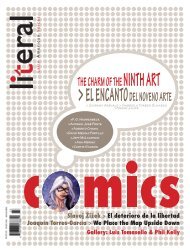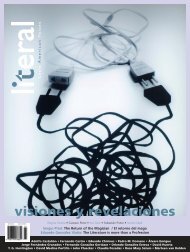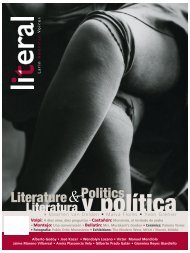Richard Serra - Literal
Richard Serra - Literal
Richard Serra - Literal
You also want an ePaper? Increase the reach of your titles
YUMPU automatically turns print PDFs into web optimized ePapers that Google loves.
SV: In Mexico, have you also encountered prohibited<br />
topics, even if not on a formal list?<br />
FH: I don’t think so right now. Fifteen years ago,<br />
it was diffi cult to address certain topics. I remember<br />
that, back then when I published The Worst Lady in the<br />
World, the book came out in spite of three recommendations<br />
against it; the editor, Daniel Goldin, published<br />
it because he believed in it. It came out as a very small<br />
print-run, two thousand copies, that, little by little, got<br />
sold. In some schools, the book was banned. My own<br />
friends said that they weren’t sure about teaching a<br />
story like this to their children. It’s a situation that has<br />
changed over time. Today the quantity of books that<br />
deal with topics of this kind, like violence, vulgarity or<br />
death, has grown. Today we fi nd The Book of Dirty<br />
Words, just published by Julieta Fierro and Juan Tonda,<br />
that has had incredible success. A book like this fi fteen<br />
years ago was unpublishable. I believe that, in this sense<br />
in Mexico, yes, we have moved forward and that today<br />
the teachers, the parents, the proponents of reading,<br />
are much more open, they know that these topics DO<br />
fi gure directly in what child readers like.<br />
SV: If you had to make a list of prohibited topics in<br />
children’s literature, what would you ban?<br />
FH: I’d ban warm-fuzzy stories, excessive seriousness,<br />
the use of baby-talk and all those things<br />
which don’t recognize the child as a more demanding<br />
reader than the adult.<br />
SV: Do you believe that more “diffi cult” topics<br />
are acceptable today thanks to television or internet,<br />
which have reduced the shock factor, or has it been<br />
the fact that one reads about them more?<br />
FH: I believe that we have face-off here: technology<br />
versus literature. Today the most read book, not only<br />
by children, but of all books published, is Harry Potter,<br />
a novel that ignores technology. There aren’t any computers,<br />
there isn’t any electric light. What there is, is a<br />
delightful excess of fantasy. I feel that there is a type of<br />
nostalgia for surprise, nostalgia for that capacity to fantasize,<br />
that counterpoints that technology, that doesn’t<br />
surprise us for nothing. If you take your tape recorder and<br />
you transform it into an expresso machine, nobody will<br />
be surprised. In contrast, yes, a unicorn is still going to<br />
astound us, and all the fantastic zoology that Harry Potter<br />
presents. I believe that good literature—not children’s<br />
books but literature for children—is helping television or<br />
computer games to co-exist in harmony with stories. I<br />
don’t want to say that it’s necessary to pit television<br />
against reading, I believe that the two can co-exist.<br />
SV: Now that you mention the “excess of fantasy”<br />
in Harry Potter, I remember having read a review of a<br />
novel that I like a lot, Forever in Check, by Gonzalo Lizardo,<br />
where the author is accused of an excess of imagination.<br />
What do you think of this?<br />
FH: Today this inner-confl ict exists in readers, especially<br />
adult readers, a fear of imagination. A novel<br />
which has basis in the history, in the political and social<br />
reality of the country or the world, has a meaning.<br />
But when things get mixed up in that other kind of<br />
trip via the imagination, many feel that it’s dangerous,<br />
that it runs counter to a grounding in reality and that<br />
we can come to lose sight of the it. I think totally the<br />
opposite: as a result of reading books about imagination,<br />
about fantasy, you can come to understand reality<br />
much better.<br />
SV: In one of your stories, Campus Life, you refer<br />
to a cancellation of classes in a big university. It is<br />
unavoidable to think immediately of the National Autonomous<br />
University of Mexico and the recent confl icts<br />
there that led to the standstill. It turned out to be an<br />
almost prophetic text because it was written and published<br />
before the events about which it told.<br />
FH: Yes, it could have seemed prophetic; I don’t believe<br />
that it was. In the fi nal analysis, it is something<br />
that is in the atmosphere, it’s the confl ict that can exist<br />
in education. At the fi rst of the current administration,<br />
it’s in what budget allocations tried to punish the most,<br />
the line item of education. The president believes that<br />
it is necessary to invest in the fi ght against poverty, in<br />
combating delinquency, in the stimulation of rural life,<br />
etc. I believe that if we start out with education, it will<br />
come to combat poverty, insecurity, something that our<br />
elected offi cials have never seen that way. In the air,<br />
there was this possibility that one day the universities<br />
would turn into the equivalents of big stores and leave<br />
off educating itself.<br />
SV: And you have another story, Planted, which<br />
talks about that real-life incident when the prosecutor<br />
was mixed up with a hypothetical prophet to carry out<br />
a clandestine burial.<br />
FH: That was due to a proposal by Marin Solares<br />
who asked different writers to take a topic from national<br />
political or social reality and transform it into a<br />
story, coming out of the gist of what Carlos Fuentes<br />
was saying: that reality is robbing writers of plots. Today,<br />
if we made synopsis of what happened with Carlos<br />
and Raul Salinas de Gortari, with Gloria Trevi, or<br />
with the pedofi le priests, etc., we would read it as if<br />
it were fi ction. We’d ask ourselves, What kind of perverse<br />
mind thinks up such a mind-boggling story? I<br />
have another prior story that also comes out of a certain<br />
reading of reality: when the previous president,<br />
Vicente Fox, won the elections, I imagined what would<br />
happen if two guys came to the president and told him<br />
that they wanted to buy the country and they wanted<br />
to run it as if it were a private enterprise. Even though<br />
the story is mind-boggling, the consequences from Fox<br />
aren’t so far from that.<br />
OTOÑO, 2007 • LITERAL. VOCES LATINOAMERICANAS 3 39






